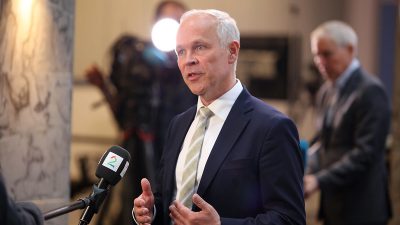Finance Minister Jan Tore Sanner admits to a lot of uncertainty regarding prospects for renewed economic growth in Norway. The revised state budget he proposed this week to bring the country out of the Corona crisis was nonetheless getting generally good reviews, despite its record withdrawals from the Oil Fund.

“The government is burning through lots of extra oil billions,” wrote commentator Kjell Werner of the large ANB news media group on Wednesday. “That seems to be sensible crisis policy, even though it’s NOK 90 billion more than what the government proposed last fall.”
Werner’s comments amounted to rare praise of Sanner’s Conservatives-led government from a left-leaning media group that editorially promotes election of a new Labour-led government this fall. They reflected, though, widespread satisfaction of how the current right-center government has led Norway through the crisis, thanks not least to the country’s huge sovereign wealth fund. While most other countries around the world have had to borrow heavily and seen their national debt skyrocket during the Corona crisis, Norway could lean on solid resources to ease the pain.
Sanner is essentially balancing his revised state budget with a record total of NOK 402.6 billion in 2021, much more than he or any finance minister is normally allowed to use. The Oil Fund money that will now be spent instead of saved for future generations’ pensions amounts to 3.7 percent of the current value of the sovereign wealth fund. That’s less than the 4 percent earlier allowed, but much more than the 3 percent rule that the current government itself ushered in a few years ago.
There were few complaints about the record use of oil money that can be equated to savings for a rainy day. As rain literally poured down in Oslo in Wednesday, the metaphor eerlily applied: Sanner needs the money to fund more crisis relief packages aimed at preserving jobs, household incomes and keeping the economy rolling despite all the Corona restrictions still in place.
“We’ll be extending several relief packages, because we see that we’ll need to live with strict infection control measures for a longer period,” Sanner said. That will include wage support through August for businesses that call back laid-off employees, an additional NOK 7.3 billion to be dealt out to local governments around the country to help cover their Corona costs, more cost compensation for small and medium-sized businesses and compensation for businesses that had to discard fresh inventory like food and even beer because they were shut down.
More money has also been earmarked to cover public transport losses and extra costs at state hospitals, schools, mental health programs and not least ferries, which had to raise ticket prices and now should be able to lower them again. An extra NOK 900 million was also earmarked for especially vulnerable groups of people, including children and youth who have suffered both socially and educationally during the crisis.
There were objections to the proposed budget from, for example, Oslo’s Labour-led city government that fears its vaccination costs won’t be fully covered. Oslo officials were pleased, however, that the state will help rescue the regional public transport system Ruter, which has suffered huge passenger declines because of home office use and infection control measures that have discouraged people from riding trams, buses or the metro.
Budget negotiations loom in Parliament, with the conservative Progress Party (which withdrew from the government 17 months ago) already demanding more cuts in the taxes that make prices for sweets, alcoholic beverages and lots of food items much higher in Norway than in neighbouring Sweden. Calls have been going out for months to “harmonize” Norwegian tax levels with Sweden’s, so that Norwegians will be more likely to continue shopping at home when the borders finally reopen.
“We have some additional priorities to reduce taxes on typical border-trade items,” Member of Parliament Hans Andreas Limi, Progress’ finance policy spokesman, told state broadcaster NRK. “We’re afraid we’ll see a boost in border trade when the borders open. We want to see that trade stay in Norway, also to preserve jobs.” Since Sanner’s government now has a minority position in Parliament, it will need Progress’ support to get the budget approved.
Sanner is braced for battle but stresses that the Norwegian economy may rebound quickly when the Corona crisis recedes. The government predicts the mainland economy (excluding offshore oil revenues) will grow by 3.7 percent this year. The pace of economic recovery, Sanner notes, will depend on how the infection situation develops, how quickly vaccinations proceed and on how early Corona containment measures can be phased out.
“The crisis isn’t over, but things look brighter,” Sanner said. “I have great faith that we’ll see activity pick up in Norway during the summer and through the autumn. Lower infection rates and a steady increase in the numbers of people getting vaccinated give reason for optimism, even though uncertainty remains high.”
newsinenglish.no/Nina Berglund

